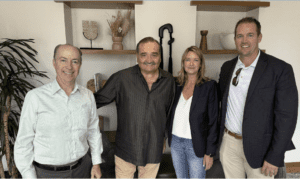 If we are what we eat, then for world-renowned chef, entrepreneur and author, Alain Ducasse, the very definition of what we are starts with respect. Ducasse spoke recently to students at Ecole hteliere de Lausanne (EHL) about his new book ÔManger Est un Acte Citoyen’, along with his co-author, Christian Regouby, Dlgu Gnral of the Collge Culinaire de France.
If we are what we eat, then for world-renowned chef, entrepreneur and author, Alain Ducasse, the very definition of what we are starts with respect. Ducasse spoke recently to students at Ecole hteliere de Lausanne (EHL) about his new book ÔManger Est un Acte Citoyen’, along with his co-author, Christian Regouby, Dlgu Gnral of the Collge Culinaire de France.
Since the 1950s food production has undergone mass industrialization. As such, our relationship to food has become numb, wherein spikes in obesity speak to our addiction to salt and sugar and our disregard for our other senses.
Ducasse seeks to re-awaken our senses and change the way we eat, predicating a return to honest and simple food where pleasure is king. This requires us to fundamentally change our bad eating habits. Ducasse and Regouby believe there needs to be greater respect for the selection of ingredients, for non-industrial production systems, and finally for the producers themselves.
This level of respect that Ducasse and Regouby advocate requires everyone’s active participation – it is part of our civic duty, as they have put it -Êand calls for a long-forgotten connection to the food we eat. They remind us that behind our food there is a story of the men and women who produce it and who deserve a great deal of respect for the heart and passion needed for this line of work.
Ultimately, it is our responsibility to eat better and to demand healthier, more sustainable nutrition. Ducasse encourages us to demand more of our governments for better-sourced food and for transparency about what is in our food ingredients.
Montesquieu famously wrote: ÒIl y a trois choses importantes dans la vie: la premire est de manger; les deux autres je ne les ai pas encore trouves.ÊThere are three important things in life: the first is to eat; I have not yet figured out what the other two are.Ó
Despite a 300-year gap, Alain Ducasse and Charles de Secondat, Baron de Montesquieu (1689-1755) share a similar philosophy about life, priorities and relationships, and how all this relates to food. From the moment we are born, food is at the center of our lives and our interactions with the world.
Ducasse and Regouby emphasize the way in which food is about much more than nutrition: it is about creating lasting relationships and sharing with the ones we love. At the end of the day, eating is about pleasure, about nurturing the happiness of others, while also fulfilling our own pleasure. To them, cooking is more than about making food: it is an act of self-reflection. Through the preparation of food, we tell a story which is intrinsically very personal.
When it comes to cooking and eating, Ducasse calls for a drastic reduction in the quantity of sugar and industrially-produced meat and fish we consume; and for people to seek out quality and humane conditions in the supply chain. Instead, he believes that we must eat more grains and vegetables for our own wellbeing, as well as that of the planet.
For Ducasse, vegetables are tangible while experiences are not; yet through the simple act of cooking we turn the vegetable into an experience and, perhaps, a memory.
His recipe for success combines passion, attention to detail, rigor, working always harder, always faster, and always better. If one of these elements is missing, then you are bound to fail Ð it’s a delicate balance. Had he not been a cook, Ducasse believes he would have been a lifelong traveler, an architect, bringing with him an insatiable curiosity for what the unknown.
And their advice to EHL students? They believe they’re lucky to have a good head on their shoulders and that they possess the right values and training to venture out into the world. They encourage students to travel, seek out inspiration, welcome adventures big and small, and to be generous; in effect, to build their own professional and personal DNA.
Ducasse offers this striking insight to young people entering tomorrow’s workforce: in a world where everything is increasingly similar, strive to be different and keep an open mind. He reminds us all that there is great strength through diversity and unbound creativity.
Eating is the one thing we all have in common. Perhaps, a greater respect for food could be the solution to bring about peace.
By Elena Goldblatt

Elena Goldblatt is an EMBA student at theÊEcole htelire de Lausanne. Previously, she worked as a chef and food writer in Italy and in the United States. Elena has co-authored two cookbooks. She holds a Bachelor’s degreeÊwith distinction in History from Yale University.Ê
Ê















